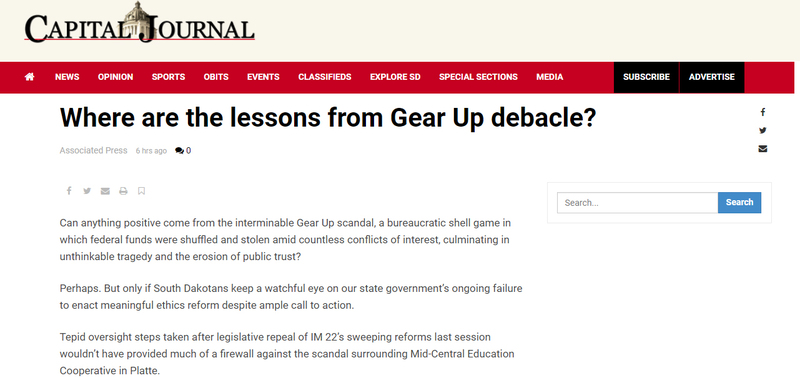Can anything positive come from the interminable Gear Up scandal, a bureaucratic shell game in which federal funds were shuffled and stolen amid countless conflicts of interest, culminating in unthinkable tragedy and the erosion of public trust?
Perhaps. But only if South Dakotans keep a watchful eye on our state government’s ongoing failure to enact meaningful ethics reform despite ample call to action.
Tepid oversight steps taken after legislative repeal of IM 22’s sweeping reforms last session wouldn’t have provided much of a firewall against the scandal surrounding Mid-Central Education Cooperative in Platte.
Answers are still being sought, in courtrooms and elsewhere, after $1.4 million intended to brighten the future of Native American students was stolen under the nose of the state Department of Education — a lingering black mark to Dennis Daugaard’s tenure as governor.
Moves toward ethics reform have failed to match the intensity of public outrage. Even if small steps toward government accountability had been taken earlier, it may have sparked more scrutiny of executive branch officials whose job was to provide administrative oversight and protect the state’s interests.
In the case of Gear Up, which crossed into human tragedy with the heinous actions of Mid-Central business manager Scott Westerhuis, it’s interesting and disturbing to see Education Secretary Melody Schopp continue to deflect blame from herself and her department.
Schopp was inexplicably slow to grasp and act upon the fraudulent practices of the educational cooperative. When she finally moved to pull the plug on the contract due to sloppy bookkeeping and poor results, she requested a meeting with Mid-Central director Dan Guericke, a longtime acquaintance who now faces felony charges.
When Guericke asked about reason for the meeting, Schopp told him over the phone that the state was canceling the Gear Up contract. Because of that phone call, Guericke was able to inform Westerhuis of the state’s decision, paving the way for the destruction of evidence.
No one could have anticipated the horror of what occurred at the Westerhuis estate, where the business manager killed himself and his family and set fire to their home. But there were major missteps amid a shocking inability to comprehend the magnitude of financial malfeasance.
Schopp herself testified before the Government Operations and Audit Committee this week as legislators assessed the extent of their power to investigate the scandal, with some calling for a greater legislative watchdog role over the executive branch.
They’ve identified the right problem. But going back to the type of independent accountability board proposed by IM 22 is the best way to deliver significant ethics reform.
The watered-down accountability board only oversees the executive branch and statewide office holders instead of covering all state workers and contractors, and citizen representatives have been replaced with retired judges appointed by the governor.
For South Dakotans repulsed by the lack of transparency in the EB-5 scandal under former governor Mike Rounds and then the Gear Up debacle under Daugaard, the executive branch naming its own overseers is an unacceptable response.
Guericke and two others stand accused of various felonies including grand theft and falsification of evidence stemming from the scandal. Regardless of how those prosecutions conclude, Daugaard and Attorney General Marty Jackley will undoubtedly seek to claim that the Gear Up mess has been adjudicated and meaningfully addressed.
They might even cite the new accountability board as evidence that state leaders have learned their lesson and are actively seeking to rebuild the public trust.
Voters are smarter than that. They see the damage to our state when something as disturbing and preventable as Gear Up takes place and want to see a degree of accountability. Maybe it’s as simple as someone saying, “This happened under my watch and I take responsibility. Let’s find out where we stumbled and fix it.”
Instead, Schopp seemed to suggest this week that her department’s role was overblown and there was no direct indication of anything amiss as more than $1 million was siphoned from federal education grants instead of reaching Native American students.
“We made our determinations on fact, not hearsay,” she told lawmakers.
Citizens can say the same. It’s a fact that greater checks and balances are needed to serve as deterrent for ethical abuses in Pierre, which is why IM 22 passed against all odds last November.
It’s a fact that trust was not restored when legislators chose to strike down that law and replace it with more tepid measures that help them protect their own.
And it’s a fact that when something as egregious as Gear Up rocks a state in scandal, people in power should be willing to accept blame rather than pass the buck, a necessary step in the ongoing march to restore public faith.
Mentions
Litigation Cases
States
- South Dakota
Videos





Subscribe for News
Site Digest
Join Professionals on EB5Projects.com →
Securities Disclaimer
This website is for informational purposes only and does not constitute an offer or solicitation to sell shares or securities. Any such offer or solicitation will be made only by means of an investment's confidential Offering Memorandum and in accordance with the terms of all applicable securities and other laws. This website does not constitute or form part of, and should not be construed as, any offer for sale or subscription of, or any invitation to offer to buy or subscribe for, any securities, nor should it or any part of it form the basis of, or be relied on in any connection with, any contract or commitment whatsoever. EB5Projects.com LLC and its affiliates expressly disclaim any and all responsibility for any direct or consequential loss or damage of any kind whatsoever arising directly or indirectly from: (i) reliance on any information contained in the website, (ii) any error, omission or inaccuracy in any such information or (iii) any action resulting therefrom.



